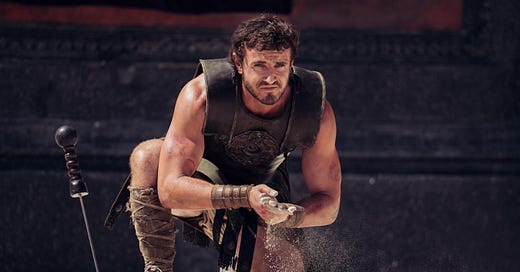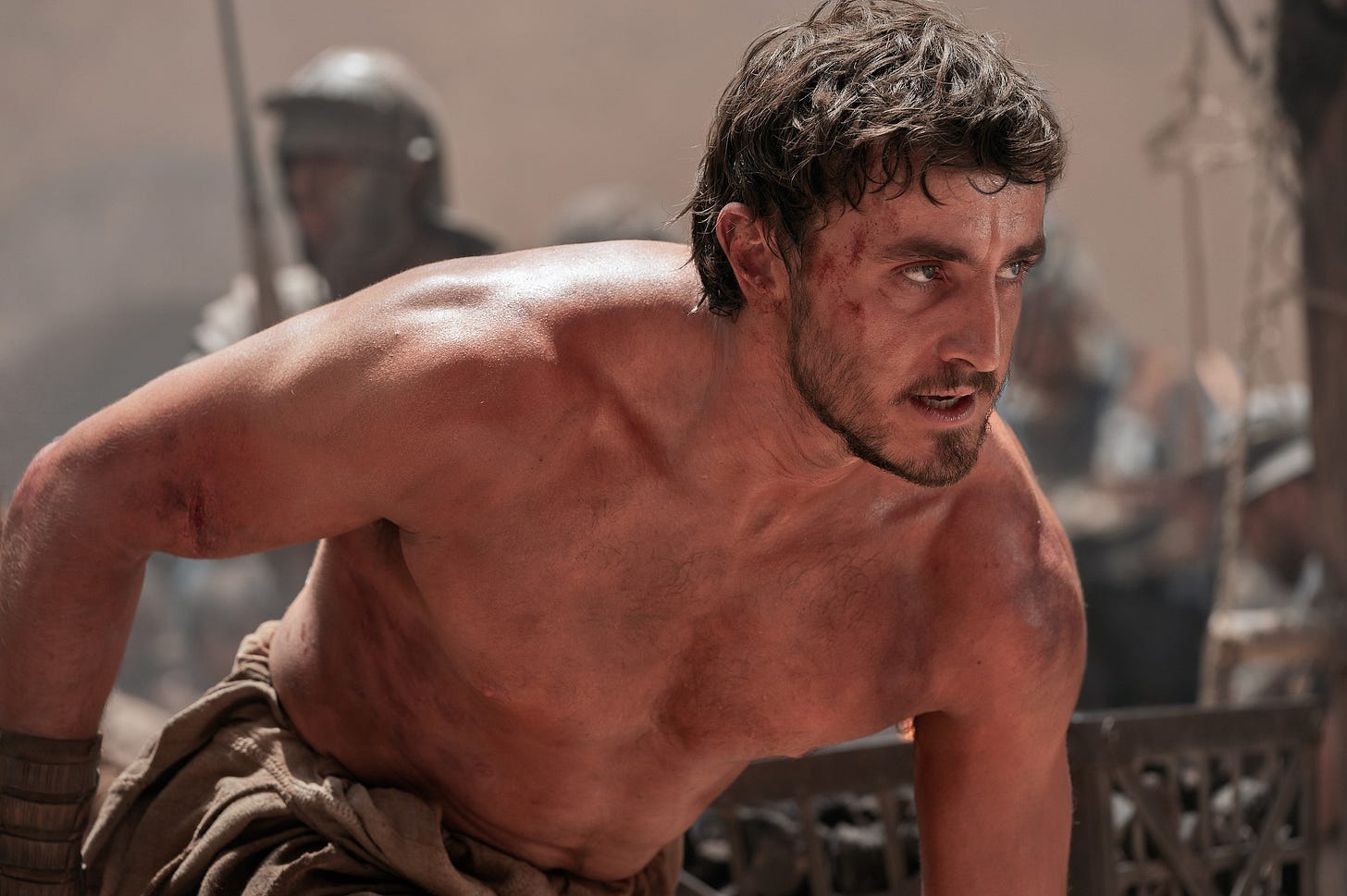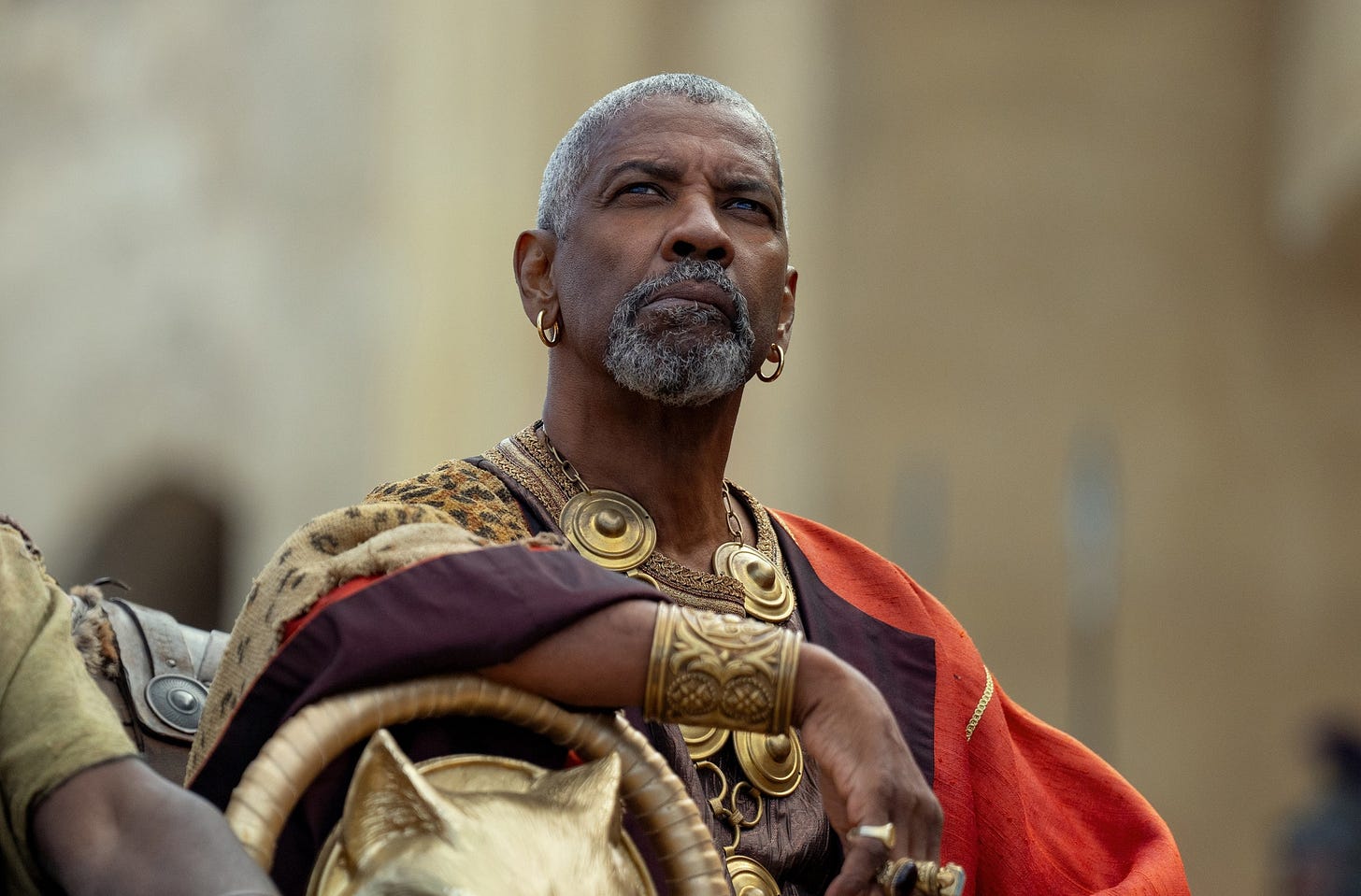A potential sequel for Gladiator, even with its initial success considered, always seemed to exist in something of a closed loop.
Sure, there were narrative threads left open but nothing, at face value, that could be deemed a surefire franchise starter.
A slow burn of the highest order.
That which took returning director Ridley Scott and a rotating cast of collaborators, through the creative peaks-and-valleys of development purgatory, twenty four years to bring to the screen,
The result then? The aptly-named Gladiator II, which debuted late last month.
And despite that wait, there is nothing immediately pressing about the film. It has a clear task at hand and executes it well yes but without any real flourish, either.
A strongly made, very well-acted and if at times, almost deeply predictable epic which sets the table for more to follow.
As expected.
After his wife (Yuval Gonen) is killed, his home razed and himself captured by the Roman army, Lucius (Paul Mescal), once a solider of merit, is forced to fight for his life as a gladiator in the Colosseum.
Though as he reluctantly establishes himself as something of a leader amongst the men there, Lucius also strives for vengeance against General Acacius (Pedro Pascal) the man who led the after mentioned attack - while also coming to accept a secret long thought forgotten: he is the son of Maximus Decimus Meridius (Russell Crowe), he, the protagonist of the original Gladiator (who is briefly seen in flashback sequences).
However, having become increasingly cynical regarding the cost of war, Acacius plots to depose the Empire’s wildly unstable dual Emperors (Joseph Quinn and Fred Hechinger) with the help of his wife, Lucilla (Connie Nielsen): who soon realizes that the Colosseum’s newest warrior, in Lucius, is her long-lost son.
But behind them all is Macrinus (Denzel Washington), a former slave turned powerful politician who will stop at nothing to see his own goals come to fruition, whatever the cost.
It is a full set-up across the board, one that director Scott and the movie’s credited screenwriter David Scarpa (who also received a story credit next to Peter Craig), work to slowly unfurl. With a runtime that is just shy of two-and-a-half hours though, momentum is, despite the high intensity action, something Gladiator II can often struggle with.
Fortunately, it is buoyed by the performances which, supporting and lead both, bring a great deal of energy to the proceedings.
As Acacius, Pascal pairs his natural charm with a believable weariness. A general though he may be, he has grown tired of conquest and the expendable, childlike callousness for which his Emperors treat it.
His arc then, in this respect, is perhaps the movie’s best.
Though initially established, through Lucius‘ eyes, as an irredeemable antagonist, his humanity soon comes into focus with a destiny far more complex than initially envisioned - one that Pascal brings a strong honesty too.
Playing off him well, in similar spirit, is Nielsen, reprising her role as Lucilla from the original film.
Having accumulated much power within all spheres of Roman politics both publicly and behind closed doors, she is a woman that commands respect no matter where she goes - but the revelation of Lucius’ return to Rome, under such challenging circumstances, forces her to wield that influence to her own ends.
At first rebuffed by Lucius, who she has not seen for sixteen years, she comes to kindle within him the same fire that burned within his father, Maximus: the dream of a Rome in which all are free of tyranny. And although she isn’t given much material beyond this, Nielsen does quite well in pushing off plot-driven limitations to infuse it with the requisite emotion.
Conversely, as the Emperors, neither Joesph Quinn (as Geta) nor Fred Hechinger (as Caracalla) are all that effective.

They’re clearly trying to avoid directly channelling Joaquin Phoenix from the first film but not only is that comparison inescapable, it is, ultimately, detrimental. Both are fine actors of course but here, their efforts seem wholly misplaced, misdirected and at times, yes, miscast. One can’t truly appreciate them as either serious threats nor as full-on camp caricatures which was obviously the intended approach, in having them exist somewhere in the middle.
Given a great amount of screen time but in the end, doing very little of value with it.
In smaller roles however, Alexander Karim as the former gladiator turned in-house Colosseum doctor does well, forging an important friendship with Lucius, alongside Derek Jacobi, who returns in his role as Roman Senator Gracchus from the original film.
It is Denzel Washington however, as Macrinus, who is the movie’s standout. It tracks: Washington, having worked with both Scott and his late brother Tony over the course of his illustrious career, is the definition of sheer charisma, the rare actor who is able to take any material and consistently elevate it on the back of his artistic interpretation alone.
And with this, Washington brings Macrinus to clear life.
He is someone who, as a former slave, has seen the worst of his fellow man and has no time for the grandstanding that accompanies Roman politics. But as a player of notoriety in his own right, he maneuvers slowly through the arena of which he has made his home with a cool confidence. Weaponizing his broader sway and raw magnetism in the advancement of his ultimate goal - he will be Emperor, damnation to those who try and stop him.
So at first, in the service of this goal, he looks to mentor and even, supposedly, befriend Lucius, promising him vengeance against those who have wronged him.
A weapon, “an instrument”, of his own making.
And sure, as a viewer, the “well, he has ulterior motives” sheen is cut-and-dry but Washington presents it with just enough earnestness to keep it believable, only until he knows he longer needs too, in the face of Lucius’ personal reawakening. The fate of Rome, though grandiose, may hang in the balance but to Macrinus it is secondary, despite his aspirations. Will leaving it there best serve him and if so, for how long?
Washington (as his all-time-press tour for the movie highlighted) openly relished in not just mining these questions off the page but fully speaking to them on camera, as well. Just what makes this character tick: be it open antagonism or something more morally ambiguous and/or emotionally-romantically unexplored (Washington revealed his character had a same-sex kiss that didn’t make the final edit - one of the film’s producers, Scott and Nieslon thrice said was removed simply because of time constraints).
Though it is as the lead, the protagonist Lucius, that Paul Mescal, naturally, draws much of the film’s focus.
And it does help to recall that the character was established in the first movie (played as a child by Spencer Treat Clark) but here, as an adult, it is only the basics on which that characterization is pulled from as Mescal creates a role all his own.
Hardened by both his childhood trauma and that most recent - the loss of his wife - Lucius is a man, who, cold and seemingly unfeeling are the easier-to-point-to descriptors, as he buries his pain deep down.
But Mescal, alongside his collaborators in Scott and screenwriter Scarpa, steadily allow that exterior to fall away revealing a man who is prideful yet knowingly committed to something beyond his earth-bound meaning.
Speaking to this then, his relationship with Lucilla is key: coming to eventually forgive his mother for sending him far from Rome as a boy (for his own safety, as the technical heir to the throne) but also, to better understand the plight that still affects her people, undone by corruption.
Mescal and Nielsen don’t share too many scenes together but it is a dynamic they portray successfully, with competing undercurrents of conflicted love and straightforward truthfulness.
Though Mescal, speaking to GQ this past October, acknowledged how stepping into the role, his first major blockbuster film, was an exercise in mastering many disciplines: be it committing to the physical preparation or working to simply “get out of his head” when faced with a project of such scale.
And, to his credit, he is a leading man worth his salt, even if burdened with the lion’s share of Gladiator II’s most unsurprising beats. Of course he comes to accept his heritage. Of course he comes to see, with a clear idealism, his grander purpose. Of course he rises to defeat the contrasting evil that opposes such thinking, etc, etc. Don’t misunderstand, Mescal hits these notes and does so well but unlike Russell Crowe before him, fair or not, he lacks a certain passion, a character-adjacent allure.
A leader he becomes but not through his own sheer force of will, at least, for the majority of the story’s running time. By design, through the writing and his direction? Maybe, though it leaves the film’s final stanza then without too much raw emotion or suspense.
Predictable, in the worse possible way.
Though, perhaps, it is all by design, with a potential Gladiator III already something Ridley Scott has discussed and a bigger-picture arc for the character then, to be considered. Even if the “in-the-moment” feeling, regardless, doesn't wholly dissipate.
Scott, it should be said, is one of his generation’s most accomplished action filmmakers and so his aptitude here, either way, isn’t much of a shock, with both his work and that of his colleagues understood - the set design is impressive, the costuming is subtle but not too gaudy, the cinematography and fight choreography both are crisp and functional but not all that noteworthy either. Although, not overly gratuitous, given the subject matter (bloodsport), there is a restraint, a maturity, that is appreciated.
Yes, it is a movie rife with historical inaccuracies and other missteps that are too prominent to ignore - including the controversy surrounding actress May Calamawy, who had virtually all of her scenes removed (her political leanings, the operating reason in the discourse but not so, according to one of the movie’s producers).
But in separating themselves, just enough, should they choose, one can enjoy what the project clearly set out to achieve: pure spectacle in which its performers no doubt enjoyed showcasing.
And on those raw metrics alone, Gladiator II is a solid, if somewhat unspectacular success.








